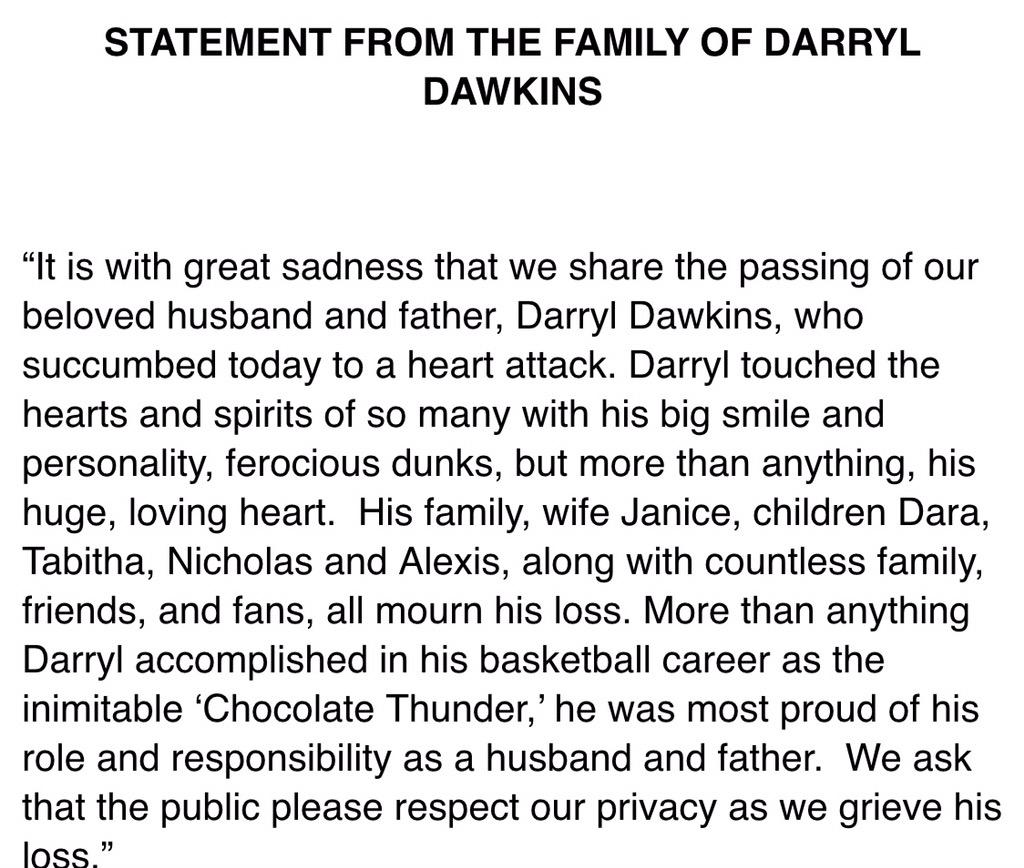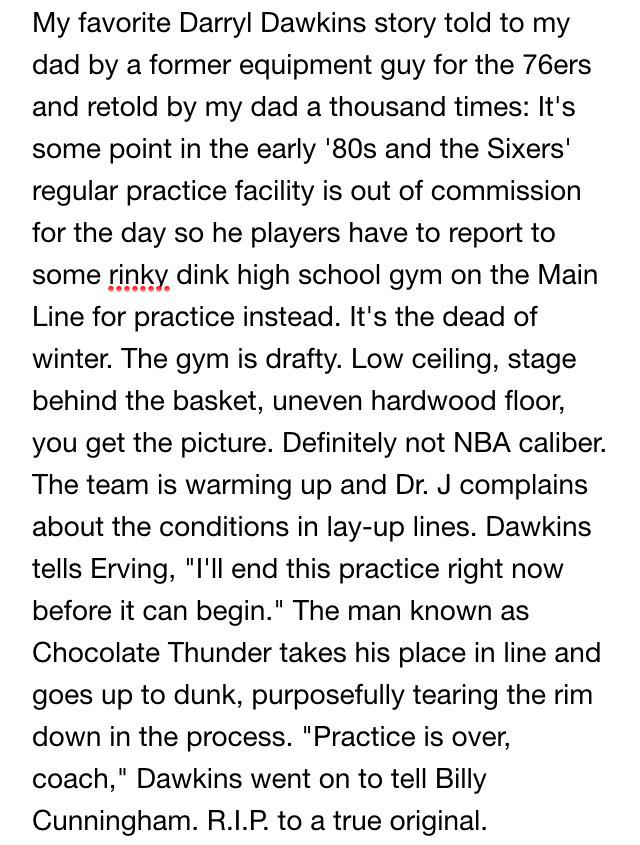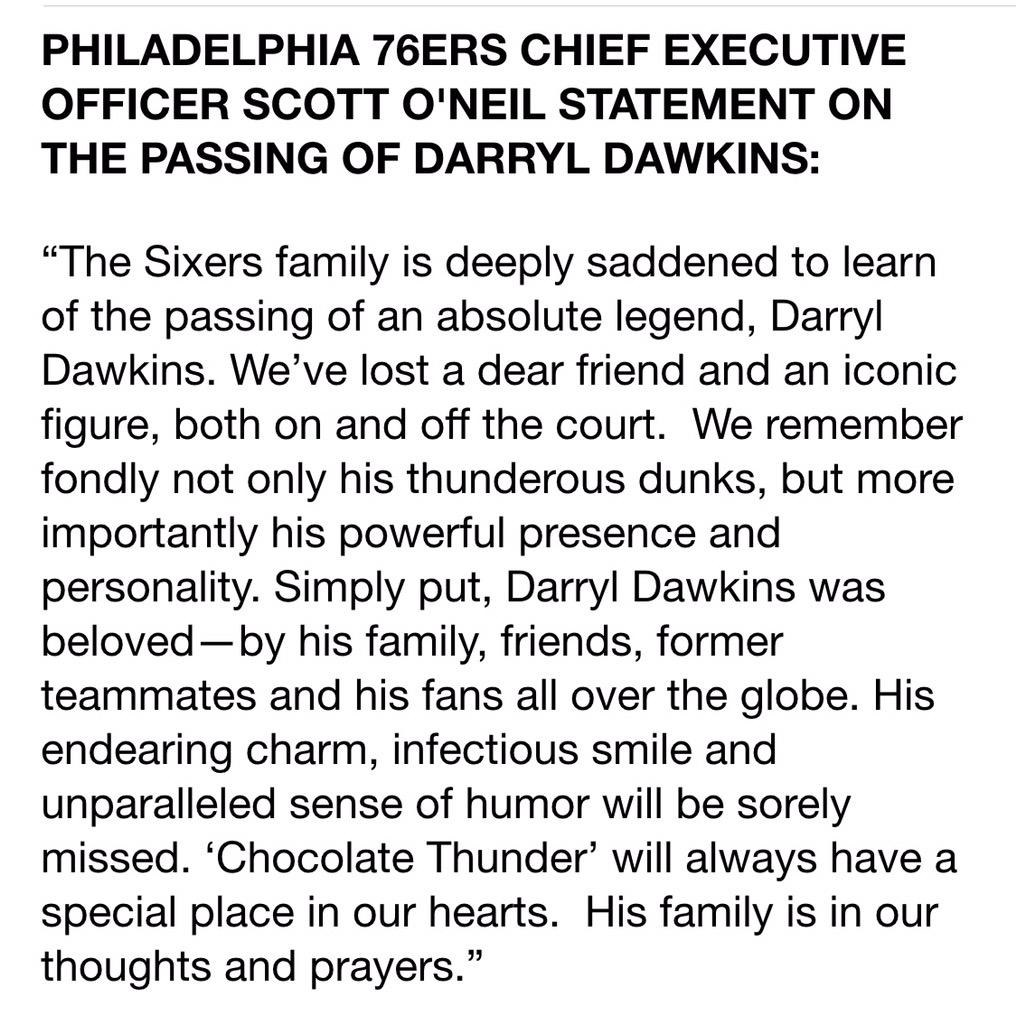But Darryl's abilities and physical gifts allowed him to pull it off! He was also light-years ahead of his time as the second straight from high school NBA drafted player, something that the NBA secretly did not like and would be a thorn in Dawkins career with the endless cheap foul calls they would make on him. Here is one comment left on Yahoo by one of many who remembered how it became obvious that calling fouls on him was being purposefully done.
Michael 6 hours ago
Through it all though? One thing I will ALWAYS REMEMBER is the fact that Darryl Dawkins was a very approachable Blackman who genuinely APPRECIATED PEOPLE. RIP Chocolate Thunder!
3
8
Ball Don't Lie
Darryl Dawkins, the legendary 'Chocolate Thunder,' dies at 58
Darryl Dawkins, the backboard-shattering big man better known as "Chocolate Thunder," who became the first high-school player ever to jump straight to the NBA, beaming down to our lowly orb from Planet Lovetron to entertain fans and rattle rims as one of the most colorful and singular characters in NBA history, died Thursday. He was 58.
WFMZ-TV of Allentown, Pa., first reported news of Dawkins' death. Shortly thereafter, the NBA confirmed his passing via its @NBAHistory Twitter account. The New York Daily News confirmedthat Dawkins died at Lehigh Valley Hospital-Cedar Crest on Thursday.
Dawkins' family confirmed that he had suffered a heart attack in a statement released Thursday afternoon:

The Philadelphia 76ers, the team that drafted Dawkins and with whom he spent the bulk of his career, also issued a statement on his passing:
The Brooklyn Nets, for whom Dawkins played when they were located in New Jersey from 1982 through 1987, also issued a statement after his passing:
“The entire Brooklyn Nets organization is deeply saddened to learn of the passing of legendary player Darryl Dawkins. As a member of the Nets in the 1980’s, Darryl, known as Chocolate Thunder, entertained fans on the court with his powerful dunks and effervescent personality, and also made an enormous impact in the community. Following his playing career, Darryl remained a part of the Nets and NBA family by serving as an ambassador and sharing his love of the game with countless fans. He had an amazing personality and touched everyone in a positive way. Our heartfelt condolences go out to the Dawkins family and to all those who had the pleasure of knowing Darryl. He will be deeply missed.”
Born in Orlando, Fla., on Jan. 11, 1957, Dawkins rose to prominence as a teenage star at Maynard Evans High School. In 1975, one year after Moses Malone made the unprecedented jump from high school hoops to the professional ranks of the ABA, Dawkins followed suit, applying for admission to the NBA draft as a hardship candidate.
"I knew when I saw my grandmother working two jobs just to barely make ends meet, and she gave me her last 10 dollars just so I could buy some sneakers, that I had to do it," Dawkins told Dave Wohl, who both played against and coached him, for a 1988 Sports Illustrated piece.
The decision paid off when the 76ers selected Dawkins with the fifth overall pick in the 1975 draft. His reward for becoming the NBA's first preps-to-pros prospect? A seven-year contract worth a cool $1 million.
But while some expected the 6-foot-11 center to make a major-league impact from the second he set foot in the NBA, Dawkins struggled to find playing time as a teenager on Gene Shue's playoff Philly squads. He logged just 849 minutes over 96 total appearances in his first two seasons, coming off the bench behind the likes of Harvey Catchings and Caldwell Jones.
Dawkins began to come into his own in his third season. With Shue fired after six games and Billy Cunningham taking over, Dawkins earned a spot in the rotation and averaged just under 12 points, eight rebounds and two blocks per game for a Sixers side that finished 55-27 before falling to the Washington Bullets in the 1978 Eastern Conference finals.
Dawkins would spend four more seasons in Philadelphia, making the playoffs every year and helping the 76ers to two more NBA Finals trips. The dual highlights of his Sixers tenure came during late in 1979, when Dawkins — who had taken to giving his dunks colorful names, like Yo Mama, the Rim Wrecker, the Go- Rilla, the Look Out Below, the In-Your-Face Disgrace, the Cover Your Head, the Spine Chiller Supreme, Dunk You Very Much and the Sexophonic Turbo Delight — took his signature stuffs to another level:

After six postseason berths in seven years in Philadelphia, Dawkins found himself on the move, shipped up I-95 to the New Jersey Nets in exchange for a future first-round draft pick. He had two productive seasons in Jersey, missing just two games in his first two Nets campaigns while averaging 14.4 points, 5.9 rebounds and 1.8 blocks in 27.8 minutes per game and shooting just under 60 percent from the field.
But he never again reached the championship-round heights of his days in Philly before injuries began to scuttle his career, limiting him to just 116 games over his final five NBA seasons, which saw him shuttle from New Jersey to Utah to Detroit. He remained somewhat active until 2000, playing for several clubs in Italy, spend some time with the Harlem Globetrotters, and occasionally suiting up for clubs in American minor leagues. But he never saw NBA action after February 1989.
In his latter years, Dawkins transitioned into coaching — most recently, he'd served as the head coach at Lehigh Carbon Community College in Pennsylvania — and became something of an NBA ambassador, regularly appearing at league events like the annual All-Star Weekend festivities and reaching out to many in the New Jersey and Pennsylvania communities in which he spent the bulk of his career. He leaves behind his wife, Janice, and four children: daughters Dara, Tabitha and Alexis, and son Nicholas.
There are those who look at Dawkins' physical tools and estimable skills, and then look at his relative lack of on-court accomplishments — 15 seasons, no All-Star berths, no All-NBA teams, no championships — and consider his on-court career something of a disappointment. Page through the clips and you'll see former coaches, former teammates and other observers wax apoplectic about Dawkins' unwillingness to put in the work necessary to maximize his gifts, to become the sort of game-changing superstar that so many expected he'd be coming out of high school. Dawkins himself later admitted that he didn't take his craft as seriously as he could have.
"I was uncoachable," Dawkins told ESPN's Tom Friend.
But he was also undeniable, irresistible and, in the broader scope of the sport, irreplaceable.
Dawkins was a force of nature who connected with scores of fans — especially young ones, in the course of conducting clinics for kids all over the world — and who in many ways prefigured modern-day stars would would make his larger-than-life, cartoon-superheroic, fan-forward approach (think Shaq, or Superman-era Dwight, or "Agent Zero"-era Gil) into an essential aspect of contemporary athlete branding. Whether or not he reached the absolute peak of his potential, there aren't many characters who have made a larger impact in basketball culture, or brought more joy into the lives of fans, or were more widely beloved than Darryl Dawkins.
He knew that. He appreciated the role he played in the life of the game, and had no regrets about the way it all unfolded, as he told Wohl in the '88 S.I. story:
Would he change anything if he could do it all over again? Dawkins doesn't even pause to reflect on the question. He has answered it to himself many times. "No," he says, shaking his head. "I wouldn't change a damn thing. I always liked being Darryl Dawkins."
You can certainly understand why.


No comments:
Post a Comment